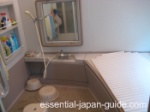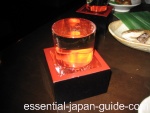Japanese Manners and Mannerisms
There are many Japanese manners and mannerisms that are quite different from those we are accustomed to in the West. Familiarization with these mannerisms will help you avoid committing a cultural faux pas during your visit to Japan or interaction with Japanese people.
Perhaps the number one rule of Japanese mannerisms and manners to keep in mind is that Japan is traditionally, and remains today, a society that is governed by politeness in its social interactions. Always err to the side of politeness while in Japan, and you’ll avoid doing something unintentionally offensive or embarrassing.
![]()
Basic Japanese Manners

 Bathing: As densely populated as Japan is, it’s no surprise that the Japanese place a great emphasis on cleanliness. As such, bathing is an important ritual that you should be familiar with.
Bathing: As densely populated as Japan is, it’s no surprise that the Japanese place a great emphasis on cleanliness. As such, bathing is an important ritual that you should be familiar with.
Learn more about the etiquette of bathing in Japan.

 Gift giving: There are many situations in which is is considered polite and proper to bring little gifts, called omiyage in Japanese.
Gift giving: There are many situations in which is is considered polite and proper to bring little gifts, called omiyage in Japanese.
Learn about the important Japanese custom of gift giving.

 Eating and Drinking: When you’re out at a bar or restaurant drinking beer or sake (which in Japanese is actually called “nihon-shu”) with Japanese friends or business associates, it is customary for drinking companions to pour drinks for one another. So never let your drinking partner pour his or her own drink. If you see their glass getting empty, simply grab the bottle and offer to pour. Likewise, it is bad Japanese manners to pour your own drink. Your Japanese companion will notice your empty glass and offer to pour for you.
Eating and Drinking: When you’re out at a bar or restaurant drinking beer or sake (which in Japanese is actually called “nihon-shu”) with Japanese friends or business associates, it is customary for drinking companions to pour drinks for one another. So never let your drinking partner pour his or her own drink. If you see their glass getting empty, simply grab the bottle and offer to pour. Likewise, it is bad Japanese manners to pour your own drink. Your Japanese companion will notice your empty glass and offer to pour for you.
Learn more about Japanese manners involving eating and drinking.

 Uniforms and Business Dress: You’ll notice that everyone from school children to elevator girls wears uniforms in Japan. Although things are loosening up a little bit, err on the side of formality when dressing for business.
Uniforms and Business Dress: You’ll notice that everyone from school children to elevator girls wears uniforms in Japan. Although things are loosening up a little bit, err on the side of formality when dressing for business.
Learn more about Japanese business etiquette.
 Removing shoes: The custom of removing shoes while indoors is commonplace in many situations in Japan, such as when entering a home.
Removing shoes: The custom of removing shoes while indoors is commonplace in many situations in Japan, such as when entering a home.
Learn more about removing shoes in Japan.
 Bowing: Bowing is another way that Japanese express politeness in social interactions. The intricacies of bowing are quite complex, and although as a foreign visitor you won’t be expected to perform this custom perfectly, some familiarity with the custom of bowing in Japan will go a long way toward smoothing your own interactions with your Japanese counterparts.
Bowing: Bowing is another way that Japanese express politeness in social interactions. The intricacies of bowing are quite complex, and although as a foreign visitor you won’t be expected to perform this custom perfectly, some familiarity with the custom of bowing in Japan will go a long way toward smoothing your own interactions with your Japanese counterparts.
 Patience: The adage “patience is a virtue” is particularly true in Japan. Japanese culture places a great emphasis on patience, and in contrast, frowns upon impatient behavior. Japan is most definitely not an instant-gratification society. The attitude of patience is prized in Japan and the Japanese even have a well-used expression for it: gaman. Likewise, you’re in Japan, you’ll notice how patient and non-fidgity Japanese people are when waiting in lines. for trains or in shops, banks, etc. You’ll rarely hear them complain out loud about having to wait, or about anything for that matter. Try to follow suit while in Japan.
Patience: The adage “patience is a virtue” is particularly true in Japan. Japanese culture places a great emphasis on patience, and in contrast, frowns upon impatient behavior. Japan is most definitely not an instant-gratification society. The attitude of patience is prized in Japan and the Japanese even have a well-used expression for it: gaman. Likewise, you’re in Japan, you’ll notice how patient and non-fidgity Japanese people are when waiting in lines. for trains or in shops, banks, etc. You’ll rarely hear them complain out loud about having to wait, or about anything for that matter. Try to follow suit while in Japan.
 Staring: In keeping with their socially reserved nature, staring at others is not considered good Japanese manners. Not only do Japanese people tend not to stare, but whereas in the West it is not uncommon to meet the eyes of strangers and nod or smile in greeting, Japanese tend to avoid doing this very thing. So don’t be put off if you feel like everyone is ignoring you. That’s not the case; they are just politely minding their own business.
Staring: In keeping with their socially reserved nature, staring at others is not considered good Japanese manners. Not only do Japanese people tend not to stare, but whereas in the West it is not uncommon to meet the eyes of strangers and nod or smile in greeting, Japanese tend to avoid doing this very thing. So don’t be put off if you feel like everyone is ignoring you. That’s not the case; they are just politely minding their own business.
 Physical Affection: Japanese by custom tend to not be physically affectionate in public. As such, hugging and kissing in public is not commonplace, and should be avoided unless the situation is informal and you have an obvious green light to do so. Romantic interaction in public is usually limited to holding hands. Likewise, hugging or kissing people you are meeting for the first time is not a common practice.
Physical Affection: Japanese by custom tend to not be physically affectionate in public. As such, hugging and kissing in public is not commonplace, and should be avoided unless the situation is informal and you have an obvious green light to do so. Romantic interaction in public is usually limited to holding hands. Likewise, hugging or kissing people you are meeting for the first time is not a common practice.
 Blowing Noses in Public: This is considered bad Japanese manners, so try to avoid this if at at all possible. Use tissue paper rather than a handkerchief when you need to wipe your nose or sneeze.
Blowing Noses in Public: This is considered bad Japanese manners, so try to avoid this if at at all possible. Use tissue paper rather than a handkerchief when you need to wipe your nose or sneeze.
 Surgical Masks: Japan first-timers are often amused at the sight of Japanese wearing surgical masks out in public when they have a cold or flu, particularly in the winter. But when you think about it, it is a good practice, particularly in a densely populated country like Japan. Rather than infect dozens of numerous bystanders, in Japan it is considered good Japanese manners to don a mask and keep your germs to yourself.
Surgical Masks: Japan first-timers are often amused at the sight of Japanese wearing surgical masks out in public when they have a cold or flu, particularly in the winter. But when you think about it, it is a good practice, particularly in a densely populated country like Japan. Rather than infect dozens of numerous bystanders, in Japan it is considered good Japanese manners to don a mask and keep your germs to yourself.
 Promptness: In Japan, it is considered very bad Japanese manners to be late, and Japanese are habitually five minutes early for meetings and appointments. Sometimes lateness is unavoidable. In such situations, try to call or inform your party in advance to let them know you will be arriving late.
Promptness: In Japan, it is considered very bad Japanese manners to be late, and Japanese are habitually five minutes early for meetings and appointments. Sometimes lateness is unavoidable. In such situations, try to call or inform your party in advance to let them know you will be arriving late.
 First Refusal: Japanese have a word called enryo, which basically means to refrain from doing something. As such, you’ll often find Japanese counterparts initially refusing when offered things like food and gifts. Don’t take this refusal at face value. Ritual requires that you offer again once or twice before acceptance becomes permissible.
First Refusal: Japanese have a word called enryo, which basically means to refrain from doing something. As such, you’ll often find Japanese counterparts initially refusing when offered things like food and gifts. Don’t take this refusal at face value. Ritual requires that you offer again once or twice before acceptance becomes permissible.
 False Modesty: Like “enryo” and “gaman,” modesty is considered to be another virtue in Japan, even when blatantly false. If you ask a Japanese friend if they are good at something, such as a sport, and they say they are not, don’t be surprised to find that in fact they are quite proficient at it. Conversely, bragging, boasting, and excessive shows of confidence are frowned upon. Even if you are very good at something, refrain from boasting. In Japan, actions are more respected than words, so try to be as modest as possible when praised or when asked about your skill in a particular endeavor.
False Modesty: Like “enryo” and “gaman,” modesty is considered to be another virtue in Japan, even when blatantly false. If you ask a Japanese friend if they are good at something, such as a sport, and they say they are not, don’t be surprised to find that in fact they are quite proficient at it. Conversely, bragging, boasting, and excessive shows of confidence are frowned upon. Even if you are very good at something, refrain from boasting. In Japan, actions are more respected than words, so try to be as modest as possible when praised or when asked about your skill in a particular endeavor.
 Apology: Japanese may ritualistically apologize more than any other people. Perhaps the most useful word in the Japanese language is “sumimasen” (sue-me-ma-sen), which depending on the context may mean “sorry” or “excuse me,” or “thank you.” Learn this word and use it liberally whenever you pose any minor inconvenience on anyone.
Apology: Japanese may ritualistically apologize more than any other people. Perhaps the most useful word in the Japanese language is “sumimasen” (sue-me-ma-sen), which depending on the context may mean “sorry” or “excuse me,” or “thank you.” Learn this word and use it liberally whenever you pose any minor inconvenience on anyone.
 Holding Doors for Others: Japanese normally do not hold doors open for the people who follow behind as people in Western countries might do, so don’t be surprised if you’re walking through a crowded doorway only to find the door closing in your face. In Japan, this is not discourteous; holding doors open for other is just simply not an aspect of Japanese manners.
Holding Doors for Others: Japanese normally do not hold doors open for the people who follow behind as people in Western countries might do, so don’t be surprised if you’re walking through a crowded doorway only to find the door closing in your face. In Japan, this is not discourteous; holding doors open for other is just simply not an aspect of Japanese manners.
![]()
Japanese Mannerisms
 Pointing: In some common situations, the Japanese way of gesturing differs from what you may be used to. For example, whereas Westerners normally aim at the chest area when pointing at themselves, Japanese point at their noses. So if you point at your chest as if to say “Who me?” your gesture may be lost in translation.
Pointing: In some common situations, the Japanese way of gesturing differs from what you may be used to. For example, whereas Westerners normally aim at the chest area when pointing at themselves, Japanese point at their noses. So if you point at your chest as if to say “Who me?” your gesture may be lost in translation.
 Beckoning: Similarly, when beckoning a person to come toward us, in the West we normally point our hand toward the sky at head level and wave toward us. The Japanese way of beckoning is to extend their hand in front of the body with the hand pointing downward, so that to the uninformed it almost looks as if that person is shooing the other person away.
Beckoning: Similarly, when beckoning a person to come toward us, in the West we normally point our hand toward the sky at head level and wave toward us. The Japanese way of beckoning is to extend their hand in front of the body with the hand pointing downward, so that to the uninformed it almost looks as if that person is shooing the other person away.
 Speaking Gestures: Japanese people tend to be far less animated than Westerners in terms of using hand and arm gestures when speaking. In fact, at some point when telling a story or trying to explain something to a Japanese person using gestures along with words, you may find your conversation partner completely distracted by your gesturing, and probably wondering why you’re flapping your arms all over the place!
Speaking Gestures: Japanese people tend to be far less animated than Westerners in terms of using hand and arm gestures when speaking. In fact, at some point when telling a story or trying to explain something to a Japanese person using gestures along with words, you may find your conversation partner completely distracted by your gesturing, and probably wondering why you’re flapping your arms all over the place!
 Engaged Listening: Another Japanese conversation mannerism is the tendency to be fully engaged in a conversation as an active listener and frequently interject listening affirmations. Conversely, if a Japanese person is telling you a story and you just listen silently without occasionally interjecting an “I see” or a “really?” or at least give an approving head nod, the speaker might actually stop talking and ask if you’re listening.
Engaged Listening: Another Japanese conversation mannerism is the tendency to be fully engaged in a conversation as an active listener and frequently interject listening affirmations. Conversely, if a Japanese person is telling you a story and you just listen silently without occasionally interjecting an “I see” or a “really?” or at least give an approving head nod, the speaker might actually stop talking and ask if you’re listening.
![]()
Japanese Train Etiquette
 Waiting for and Boarding Trains: When waiting for a train (or bus), line up and wait in an orderly fashion. Once the train arrives, first wait for those getting off the train, and then board without pushing past those in front of you.
Waiting for and Boarding Trains: When waiting for a train (or bus), line up and wait in an orderly fashion. Once the train arrives, first wait for those getting off the train, and then board without pushing past those in front of you.
 Seating Etiquette: On crowded trains, while there is usually a mad free-for-all scramble for any open seats, it is common courtesy to offer your own seat to any standing elderly, pregnant, or disabled passenger. In fact, most train lines provide priority seating for such persons, so if you’re sitting in one of these seats (which are usually found in the corner of the train and indicated with either different colored seats and a sign above the seat) and a person in need is standing nearby, you definitely should offer him or her your seat.
Seating Etiquette: On crowded trains, while there is usually a mad free-for-all scramble for any open seats, it is common courtesy to offer your own seat to any standing elderly, pregnant, or disabled passenger. In fact, most train lines provide priority seating for such persons, so if you’re sitting in one of these seats (which are usually found in the corner of the train and indicated with either different colored seats and a sign above the seat) and a person in need is standing nearby, you definitely should offer him or her your seat.
 Use of Mobile Phones on Trains: Talking on cell phones while on trains is prohibited in Japan. Upon boarding a train, set your mobile phone to silent mode and refrain from talking. Silent text messaging, however, is permitted. When near priority seats (see above), phones should be turned off completely.
Use of Mobile Phones on Trains: Talking on cell phones while on trains is prohibited in Japan. Upon boarding a train, set your mobile phone to silent mode and refrain from talking. Silent text messaging, however, is permitted. When near priority seats (see above), phones should be turned off completely.
![]()
